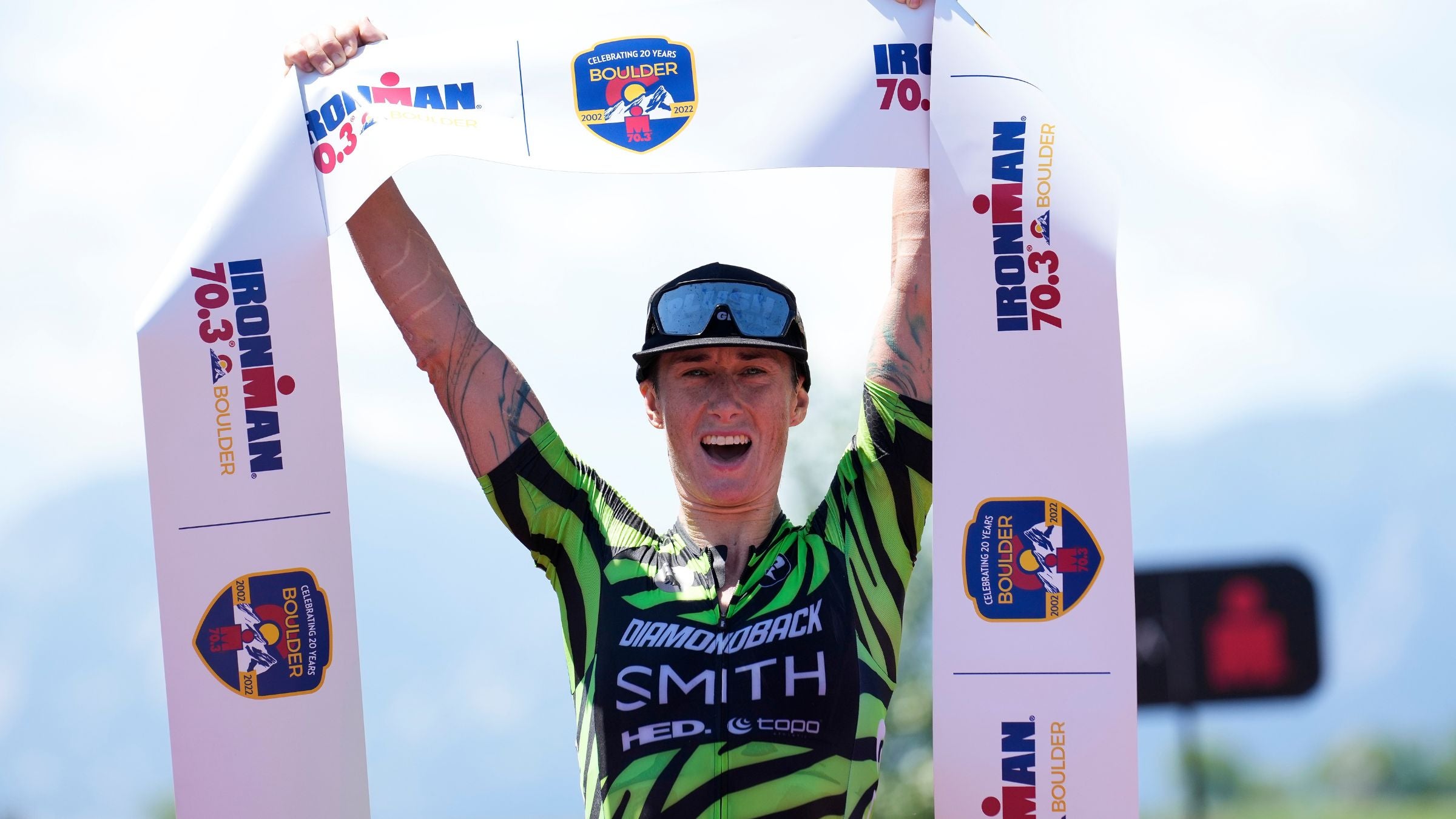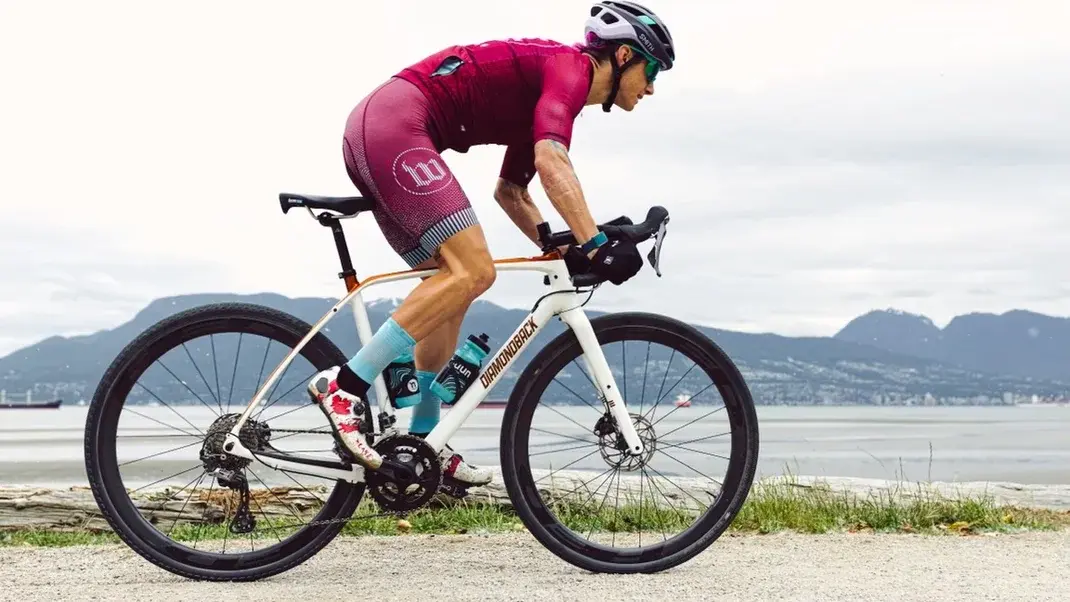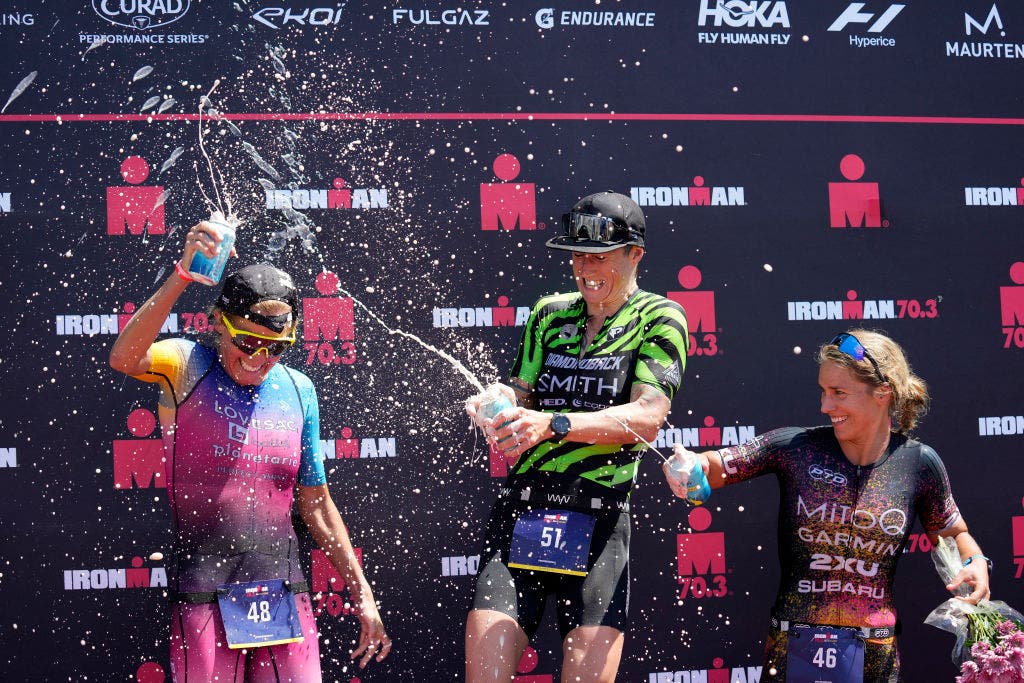How Rach McBride Used Offroad Riding To Win Last Weekend’s Boulder 70.3

(Photo: Patrick McDermott/Getty Images)
No triathlon interview is ever complete without the obligatory, “What’s next?” But rarely is the answer, “I’ve got the Leadville 100 this weekend!” It does help explain how Rach McBride smashed the field last weekend at the decidedly on-road 70.3 Boulder last weekend.
Being deep in training for the 28th edition of the legendary 100-mile mountain bike race in Colorado perhaps offers the best clue to how 44-year-old pro Rach McBride from Vancouver had posted a barnstorming 2-hour, 11 minute bike split.
Not that McBride isn’t accustomed to having the fastest bike splits or being first into T2 – the count stands at nine and ten respectively, with likely more on the way. But this one was particularly special. The highest average speed the Canadian has ever recorded at the distance, and one even more important detail – it ended with the W.
“Unbelievable. I never anticipated it – especially this year as I’m balancing all of these different things and feel half-trained at everything,” McBride said with a beaming smile. “But I’ve found it’s made such a difference to bring joy back into racing. We’re pushing and hurting, but it doesn’t mean we cannot enjoy our surroundings, the volunteers, the folks out there cheering, and not take things too seriously. That’s where I’m at in my career. Doing the bucket list races, saying yes to interesting opportunities, and just going for it.”
RELATED: The Triathlete Hour Podcast: Rach McBride Never Gets Bored
Time on the bike – in all its forms

‘“All of these different things”, as McBride puts it, includes being part of the Lifetime Grand Prix, a six-race series of gravel and mountain bike events created to promote gravel racing—with $250k on the line. This weekend is the Leadville 100 MTB, in June it was the Unbound 200-mile gravel race, formerly known as the Dirty Kanza. The season will wrap up with the Big Sugar Gravel at the end of October.
And alongside all this, there’s the day job of being a pro triathlete that McBride has kept pinned down with success for more than a decade. It’s taking a leaf out of the Cam Wurf book on triathlon that equates to just racing your bike and fitting in a bit of swim and run on the side. And it seems to be working.
“Yes. Apparently the secret is racing mountain bikes. To be honest that’s what has given me such confidence, knowing how hard I can push on the bike for a long period without having to think about running off the bike.
“I’ve a history of bike racing and have been gravel racing for several years so I have a bit of an edge on the technical side, but in between I’ve also been on the TT bike on the trainer and have specific workouts that I think are really helpful.”
How Boulder 70.3 played out
The Boulder success marked McBride’s fourth Ironman 70.3 triumph after wins in Austin (2012), Calgary (2014), and Victoria (2018). And in front of the local tri community including famous names of the sport such as Dave Scott, Mirinda Carfrae, and Julie Dibens, it was arguably the most special. It also meant – not for the first time – a large chunk of the half-marathon was spent running scared.
“Coming first off the bike is exciting, but rarely has it resulted in a win,” McBride explained. “I knew Holly Lawrence was behind me and she passed me within the first kilometer of the run. But then I saw her suffering and dry heaving on the side of the trail and thought: ‘That doesn’t look good!’ [Lawrence would later withdraw from the race]. However, I knew there were still fast runners chasing me.”
Those rivals included American triathlete Lesley Smith who would post the day’s fastest run split to finish second, but her presence initially sparked a few unwelcome memories for McBride.
“In 2015, in Challenge Knoxville, Lesley caught me 200 meters before the finish for the win. I hadn’t known she was there, and it was devastating. I was also racing on what turned out to be a broken foot, so it was a pretty painful loss in more ways than one.”
This time there would be no repeat. The two-loop run course—a mix of gravel path and off-camber dirt road—offered little shade. At altitude and with temperatures climbing towards 90 degrees F it was an attritional test.
“People were suffering,” McBride added. “Heading out on the second loop I realized how far behind everyone was and calculated how many seconds faster per kilometer faster they’d need to be running. I didn’t think I was running that slowly, and they would have to really be on fire!”
Age is just a number
It was some achievement, and one that after checking with triathlon statistician Thorsten Radde, Triathlete believes could make McBride the oldest winner of a women’s pro 70.3 division to date – 90 days older than the evergreen Dede Griesbauer, who was 44 years, 41 days when she won in 2014 in Taiwan [Editor note: Data on 70.3 racing is not 100% complete, so if any readers know better, please let us know].
Either way, at 44, McBride has no intention of quitting those “badass, age-defying, limit-pushing, adventure-prone” ways any time soon. “Folks should not make assumptions about where their fitness should be based on the number of times they have travelled around the sun. Age is a number, and don’t believe you are losing fitness because of that number.”
The focus on bike racing explains why McBride has only taken part in two other triathlons so far this year, but lining up at the Ironman World Championship in St. George and the PTO Tour event in Edmonton could hardly have been bigger tests: big fields, big money, and big challenges against the best in the sport.
“I injured myself mountain biking a couple of months before St. George, so I had two weeks to train and get whatever fitness I could. The longest run was a 90-minute walk-run, so I had low expectations, and I just needed to do my own thing and pace it. I was just really grateful to be on the start line having waited two years due to the pandemic and just had a blast, smiling and high-fiving folks.
“I didn’t anticipate getting a wildcard slot for Edmonton. I wasn’t run-trained so my coach, Mateo Mercur, said: ‘Swim and bike like you don’t have to run and see what you can do.’ I surprised myself on that run and was so proud of 15th place in that field. I took a lot of confidence into Boulder 70.3 to try it again and just crush the bike. I was 3 ½ minutes down from Lauren [Brandon] out of the water and rode through the field.”
McBride puts the success down to consistency. “There are not a lot of easy days. No one day is crazy, but there’s something challenging with very few days off. It’s more frequent doses of intensity versus occasional big, fatiguing sessions. But I have such joy in the training and process, and a strength and conditioning coach who works to help keep things firing properly – the injuries I’ve had recently have been crashing on the mountain bike versus overuse. I also don’t believe I am getting slower – case in point, I have just smashed out the fastest 70.3 bike split of my career.”
RELATED: Consistency is the Foundation of Triathlon Success

McBride’s sessions that set up the Boulder win
Pace progression on the bike
Duration: 90min+
Warm-up:
15-20min
Main set:
5min at Ironman intensity
4min at half-Ironman intensity
3min at standard distance intensity
2min at sprint distance intensity
1min almost max effort
Easy spin for 5-10min
Repeat x3
Cooldown:
15min
Rach said: “This is one of my favorite workouts, a 5-4-3-2-1 descending set but with increasing effort. It’s about understanding pacing and being able to push when fatigued to increase power – you need to have gauged it properly going into that final 1min.
Swim strength-building pull buoy set
Distance: 4,400
Warm up:
1,000 choice
Main set:
50 fast
200 using pull buoy at half-Ironman effort
50 easy
20sec rest between
Repeat x10
Cooldown:
400 choice of stroke
Rach said: “The 50 fast mimics the race take-out before setting into the half-Ironman effort, with the 50 easy for active recovery before you go again. It’s not aerobically too challenging, but a solid strength set and helps you maintain strength under fatigue. It’s comfortably manageable at the start, but by the time you get to reps 8, 9, or 10, you start to feel it.”
RELATED: One-Hour Workout: Rach McBride’s Building Blocks Bike Session